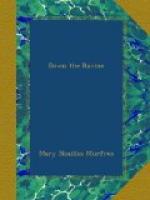And the woodpecker still was solemnly tapping, high up in the chestnut-oak tree.
CHAPTER X.
Birt, meanwhile, was trudging along in the woods, hardly seeing where he went, hardly caring.
He had not had even a vague premonition when the tanner told him that he might have the rest of the day off. He did not now want the holiday which would once have so rejoiced him, and he said as much. And then the tanner, making the disclosure by degrees, being truly sorry to part with the boy, intimated that he need come back no more.
Birt unharnessed the mule by the sense of touch and the force of habit, for blinding tears intervened between his vision and the rusty old buckles and worn straps of leather. The animal seemed to understand that something was amiss, and now and then turned his head interrogatively. Somehow Birt was glad to feel that he left at least one friend in the tanyard, albeit the humblest, for he had always treated the beast with kindness, and he was sure the mule would miss him.
When he reached home he loitered for a time outside the fence, trying to nerve himself to witness his mother’s distress. And at last his tears were dried, and he went in and told her the news.
It was hard for him nowadays to understand that simple mother of his. She did nothing that he expected. To be sure her cheek paled, her eyes looked anxious for a moment, and her hands trembled so that she carefully put down upon the table a dish which she had been wiping. But she said quite calmly, “Waal, sonny, I dunno but ye hed better take a day off from work, sure enough, an’ go a-huntin’. Thar’s yer rifle, an’ mebbe ye’ll git a shot at a deer down yander by the lick. The chill’n haint hed no wild meat lately, ‘ceptin’ squir’ls out’n Rufe’s trap.”
And then he began to cry out bitterly that nobody would give him work, and they would all starve; that the tanner believed he had stolen the grant, and was afraid to have him about the hides.
“’Tain’t no differ ez long ez ’tain’t the truth,” said his mother philosophically. “We-uns will jes’ abide by the truth.”
He repeated this phrase over and over as he struggled through the tangled underbrush of the dense forest.
It was all like some terrible dream; and but for Tennessee, it would be the truth! How he blessed the little sister that her love for him and his love for her had come between him and crime at that moment of temptation.
“So powerful peart!” he muttered with glistening eyes, as he thought of her.
The grant was gone, to be sure; but he did not take it. They accused him—and falsely!
It was something to be free and abroad in the woods. He heard the wind singing in the pines. Their fine, penetrating aroma pervaded the air, and the rusty needles, covering the ground, muffled his tread. Once he paused—was that the bleat of a fawn, away down on the mountain’s slope? He heard no more, and he walked on, looking about with his old alert interest. He was refreshed, invigorated, somehow consoled, as he went. O wise mother! he wondered if she foresaw this when she sent him into the woods.




